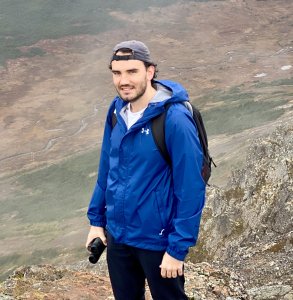Brian Regan knows how overwhelming it can be to hear the words “you have cancer” as a teenager. That is why, nearly a decade after his own diagnosis, he feels compelled to help young patients and families currently grappling with the physical and emotional challenges of treatment.
Regan, 27, is a member of the Pediatric Patient and Family Advisory Council (PPFAC) at Dana-Farber/Boston Children’s Cancer and Blood Disorders Center. He shares his story in various settings — from online and in-person forums to waiting rooms and clinics — comforting patients and caregivers and listening to their unique experiences. He then takes what he learns back to the PPFAC, an all-volunteer contingent that partners with Dana-Farber/Boston Children’s staff to advocate for improved quality of life and safety for all pediatric patients.
“There is no better way to give back to a hospital that gave so much to me,” says Regan, who joined the council two years ago. “Nobody likes being the kid with cancer, or a parent of the kid with cancer, but as PPFAC members we gladly go back into that world so that we can help people adjust.”
A physical and emotional toll
Regan’s entry to that world came in 2013 — when, at age 18, he found a bump on his testicle during a self-examination. He immediately called his doctor, and within a week had surgery that confirmed the bump as a cancerous testicular tumor. That summer, before returning to college for his sophomore year, he began intensive inpatient and outpatient chemotherapy treatment at Dana-Farber/Boston Children’s to remove any residual cancer.

Regan credits his clinical team, as well as family and friends, for helping him through those difficult days. But while he soon went into remission, and returned to school, the psychological scars of his treatment remained.
“I was trying to be normal, but was having a very hard time physically and emotionally,” he recalls. “I was bald, and knew I looked different, and one of my defense mechanisms was to be closed up. I suffered extensively with anxiety and depression, so I went back to Dana-Farber/Boston Children’s and got connected with a psychiatrist. They helped me understand that I was going through post-traumatic stress disorder, and I learned not to be ashamed of my feelings.”
A new outlook
Therapy and time have given Regan a deeper appreciation for the tremendous toll that his cancer treatment took on his family. He says he is far more empathetic and caring than before his diagnosis, and has learned not to take life experiences or his time with others for granted. In addition to cofounding a software company about a year ago, Regan also got engaged to his high school sweetheart, Katie.

Seeking out volunteer opportunities including the PPFAC is another facet of Regan’s new outlook. Monica Lazaro Davadi, MPH, program manager for both the adult and pediatric Patient and Family Advisory Councils at Dana-Farber/Boston Children’s, says that Regan has thrived since joining the pediatric group in September 2020.
“Brian is a remarkable member of the council who sheds insights on the adolescent cancer journey,” says Lazaro Davadi. “In council meetings he speaks openly about mental health, and how the process can be improved for other patients. He never shies away from asking questions, speaking up, or reaching out to me with innovative ideas and input.”
Such enthusiasm is the product of Regan’s core belief: As much as it disrupted his life, he is grateful for his cancer experience. “I cannot think of one area in which cancer has not helped me live a better life,” Regan says. “Being able to share what I’ve learned with other patients and families has been amazing.”
If you are interested in learning more about the pediatric or adult Patient and Family Advisory Councils, please contact Monica Lazaro Davadi at MonicaN_LazaroDavadi@DFCI.HARVARD.EDU or call (617) 632-4527.
